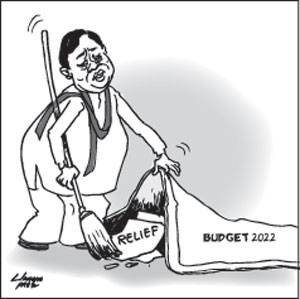News
Budget fails to address debt servicing and forex crisis
View(s):Sri Lanka’s 2022 budget, while having some positive measures, has failed to address the country’s two burning issues — debt servicing and the foreign exchange crisis.
“While it has some positives, there were gaps on how to manage debt and there was no direction on the foreign exchange crisis or some signals which foreign investors and international (rating) agencies would have been expecting,” said Dhananath Fernando, researcher and Chief Operating Officer at Advocata Institute.
Finance Minister Basil Rajapaksa’s maiden budget on Friday saw revenue and grants totalling Rs. 2.284 trillion while expenditure has been set at Rs. 4 trillion. Foreign exchange reserves at the end of October 2021 was US$ 2.3 billion, barely enough for two months of imports, while the Government is hoping for some credit-lines to stave off the forex crisis.
A banker said that the budget had no plan, no substance.
“The foreign exchange crisis is a big issue but there wasn’t a single sentence on this and how to deal with it. Other burning issues like debt management were also not addressed,” he said.
However, on the positive side, according to Mr. Fernando, there was a willingness by the Government to cut state spending, and even though small, was a signal that it intends to trim spending. “This is a good step,” he said while explaining that the one-off surcharge tax of 25 percent on over 63 top-end companies was similar to one-off taxes in the past.
Another positive for him was that the new revenue from the budget was slightly higher than the new incremental expenditure, adding: “That’s a good move”.
According to Suresh Perera, Director at KPMG Sri Lanka, there were no major changes in the tax structure except for the one-off surcharge tax adding that these one-off taxes had become a regular feature.
He said he expected some serious challenges for the Government in the implementation from January 2022 of the consolidated GST on alcohol, tobacco, motor vehicles, telecommunications and betting and gaming. “Laws have to be passed and there is not enough time to implement this,” he said, adding that the 2021 budget was faced with a similar implementation issue.
The banker, who declined to be named, said the tax structure — in terms of revenue — was unsustainable as the common practice was a 17-18 percent tax to GDP ratio while in the 2022 budget its only 10.8 percent tax to GDP ratio. “The Government needs tax money to balance the deficit. Where will that come from?” he asked.
Indrajith Aponsu, a senior economist at the Colombo University, said while there are wider issues in the economy, the budget is just a ritual causing unnecessary excitement and an anti-climax. “We need to provide more support to Small and Medium Enterprises and drive exports to about $25 billion (now $10 billion),” he said. 
For foreign investors, a more worrying issue was the recent Central Bank guidelines on conversion of foreign exchange earnings to rupees. According to FTZ Association General Secretary Dhammika Fernando, they were hoping to discuss this matter with Central Bank officials as it impacted heavily on foreign investors.

